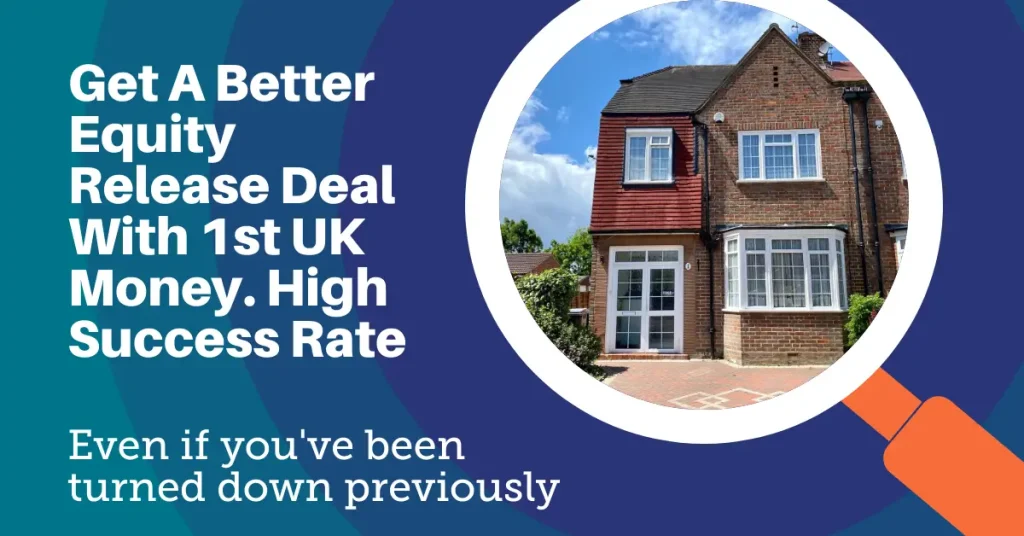Equity Release Under 55 Years Old For 2026

Home equity release under 55 can be cost-effective for many UK homeowners. Even younger people can have significant equity in their homes.
If you’re age 55 or under, you have an excellent chance to secure your finances and those of your loved ones. Equity release schemes provide individuals with access to the money tied up in their property, allowing them to make the most of their home’s hidden value.
1st UK Mortages has some excellent lenders, not featured on the comparison sites, with competitive interest rates, high loan-to-value ratios, and a range of long-term safeguards that ensure the plan meets your requirements at any age.
UK Property Equity Release Under 55 At 5.19% APRC
- No brokers fees
- No lenders fees
- New equity release product lender available from July 2026
- Lenders not shown on the “popular” comparison sites
- No redemption penalties/early repayment charges
Please Enter Your Requirements Below:

Can you release equity under 55? Yes, you can release equity in a house under 55. 1st UK Mortgages has many lenders – not featured on the comparison sites that offer equity release under 55.
Are interest rates going to go up soon?
It may be best to secure your fixed-rate equity release as soon as possible. There are some good lenders offering equity release for under 55 coming up in 2026.
Can I get a fixed rate equity release mortgage under 55?
Yes, you can, and if interest rates rise, which many economists predict they might, this could be a very savvy option for you.
Can I get equity release under 55 on a jointly-owned property?
Yes, this is no problem with 1st UK Mortgages lenders.
Should I wait and get over 55 equity release?
If you need to release equity, the rates might be higher once you are over 55. Equity release for younger people can be very cost-effective.

What is the minimum age for equity release?
With 1st UK Money, it’s less about age and more about the amount of equity you have. The theoretical minimum age for equity release is approximately 30 years old.
Can I get a bad credit equity release?
Yes, no problem. It’s more related to the amount of equity you currently have.
How does the equity release calculator under 55 work?
It uses an algorithm that considers your age, property value, existing mortgage or other charges, and the area where your home is located.
Can I get equity release under 55 on a property with non-standard construction?
Yes, homes with BISF, poured concrete, timber frames, flying freeholds, leasehold houses, and other non-standard property titles are all considered.
Is it probable or even likely that my home price appreciation could be more than the interest on my equity release?
Due to limited supply and strong demand for UK homes, many people believe home prices will continue to rise. An equity release mortgage for those under 55 will allow you to maintain 100% ownership of your home, a valuable asset, so any upside in the property market is all yours.

Does equity release on a buy-to-let property exist?
Yes, you can get equity release under 55 on a buy-to-let property.
How popular is releasing equity for home improvements and repairs?
It is very popular to release equity from your house for improvements. The most powerful home improvements are those that increase the size of your home, especially in popular areas or those where the price per square foot of homes is significantly higher than the build costs.
Can I rent out my house if it has equity release?
Subject to certain conditions, yes, you can rent your house even if it has an equity release scheme in place, depending on your specific lender.
How much equity can I release from my home?
If you can make a monthly payment, you can release virtually all of your home equity. If you don’t want to make a monthly payment, the amount of equity you can release is slightly lower.
Please Enter Your Requirements Below:

Release equity in house under 55 years old: questions and answers:
Does Lloyds offer equity release under 55?
Yes, Lloyds equity release under 55 can be ideal for many people’s needs.
What is the average interest rate on equity release plans?
Typically, the rates are around 5.17% MER fixed for life.
Does HSBC do equity release in house under 55?
Yes, HSBC offers equity release for UK properties valued over £110,000 for individuals under 55.
Can you equity release at 50?
Yes, equity release under 50 can be achieved at rates close to normal prime mortgage rates.
Does NatWest offer equity release under 55?
Yes, the NatWest equity release under 55 products can be cost-effective for some UK homeowners. Equity release at 55 can be achieved at rates under 3.17%.
Can you get equity release on a buy to let property?
Yes, as long as you have no mortgage arrears, you can release additional equity from your buy-to-let property.

Does Halifax offer equity release under 55?
Yes, Halifax equity release under 55 is an excellent product for many homeowners with property worth more than £120,000.
Are there lenders that offer equity release on non-standard construction property types?
Yes, subject to valuation, many lenders will release equity in non-standard construction houses, including BISF, steel frame, concrete panel, and timber frame houses.
Does Legal and General offer equity release under 55?
Yes, L&G equity release can have rates much lower than those of other UK property lenders.
Does TSB do equity release age 50?
Yes, TSB equity release offers very low rates for leasehold flats and freehold houses, and does not reduce the valuation of flats.

Lifetime Mortgage Under 55
A lifetime mortgage provides the same tax-free advantage for selling all or a proportion of your home equity, but you still retain full property ownership. The disadvantage here is there is interest accruing continually for the rest of your life.
With a lifetime mortgage, you’re releasing equity from your home by borrowing in advance. When you die, the lender recovers the money, plus interest, by selling your home. Interest rates on a lifetime mortgage can start at around 3.5% per year. The longer you live, the more interest is accrued, but there are generally no upper age limits.
The various types of Under 55 lifetime mortgages…
Under 55 Lump-sum equity release minimum age
This is the traditional approach to equity release whereby you’re paid a lump sum, then the interest rolls up for the rest of your life, with a flexible minimum age.
Drawdown equity release over 50
A lifetime mortgage with a drawdown allows you to withdraw smaller amounts (based on a pre-approved limit) at regular intervals, thereby reducing the amount of interest that accrues. As interest is only accrued on money borrowed from equity released, you could save by releasing cash as and when needed.
Interest Repayment
There are equity release providers available now that allow borrowers to pay interest throughout the term of the loan. This can reduce the overall interest payment applied at the end of the term, leaving more money in your estate for beneficiaries.
Enhanced Lifetime Mortgage Over 55
An enhanced lifetime mortgage is available to those with existing poor health that’s likely to lessen their life expectancy. These products offer a lower interest rate and a higher lump sum payment than traditional equity release products.

Alternatives To Equity Release For Over 55’s
If you’re eligible for equity release, consider other options before committing.
The two main options are:
To downsize or move to a cheaper area
As it sounds, sell your home and use the money to buy a cheaper, smaller home.
Take out a Retirement Interest-Only Mortgage
This option is most suitable for those in retirement who have a fixed monthly retirement income that allows them to afford to repay the interest on the loan amount each month for the rest of their lives.
Alternatives to Equity Release Under 55s
Secured finance – keeping your outstanding mortgage
Getting a secured loan means that the money you borrow is linked to an asset you own. Mortgages are a secured loan. Most lenders have minimum loan amounts, typically £10,000 or higher.
Types of secured loans include:
Homeowner loans via a mortgage advisor
These are a second charge on your property. Your mortgage is the first-charge secured loan.
Logbook loans and vehicle finance agreements
These are secured against your vehicle for a lump-sum cash.
Bridging finance on your own home
They are often large loans secured short-term against properties to bridge the gap until alternative finance arrangements are put in place.
Debt consolidation loans
It can be secured against your home in certain instances. A conventional mortgage lender can help you access money tied up in your home in specific circumstances, depending on the loan-to-value. The cash can be lent at a very low interest rate if you have sound proof of income. Your credit score could be important. To get the best deal, the age limits of the youngest applicant and other factors apply.
Unsecured finance
With unsecured finance, the amount you can borrow is usually limited to £25,000. The maximum repayment term for unsecured finance is seven years. As the lender has no security, there is a higher risk, which is reflected in higher interest rates. In particular, if you’re affected by a poor credit history.

Remortgage your property aged 55 or over
Remortgaging is most suitable when you borrow a large sum of money. It will only be appropriate (in most cases) when your existing mortgage ends, meaning you won’t have to pay early repayment charges to switch lenders.
That is provided you’re repaying capital with interest and not interest only, because you’ll have more property equity when you’ve paid capital plus interest. The more equity you have, the more likely you’ll be able to release money from the equity you’ve accumulated by borrowing more secured against your home using a higher LTV.
For example, if you’ve paid enough to have 50% equity in your property, you could remortgage for 60% or higher, releasing around 10% of your property’s value. For example, if your home is worth £200,000 with £100,000 remaining on your existing mortgage, remortgaging for 60%, LTV could release an additional £20,000.
Can I release equity if I’m under 55?
If you’re nearing 55 and want to release equity from your property, a question you’ll want to be answered sooner rather than later is, do you have to be 55 for equity release?
With 1st UK Money, you can release equity even if you are under 55 years old. Some equity release scheme lenders allow you to borrow money without a traditional mortgage lender or apply for personal loans.
How a Transfer of Equity Works without an Equity Release Plan
A Transfer of Equity can be used when one person on joint home ownership is under the age of 55 and the other over 55. Lenders won’t consider the joint application unless it’s in the sole name of the older person. Legal fees are payable, and depending on the proportion (consideration) of the amount being transferred, Stamp Duty Land Tax may be payable if it’s over the threshold.
Additionally, if there’s an existing mortgage on your home, you can’t instruct a conveyancing solicitor to transfer equity without first contacting your existing lender.
They need to assess your affordability to ensure you can repay without your partner’s income. It may be wise to transfer equity before considering equity release at 55.

How Age Impacts the Equity Release Mortgage Options Available
Age is only one factor that lenders take into consideration when you’re applying to an equity release scheme. Most lenders offer between 20% and 50% of your property’s market value through equity release with a lifetime mortgage and up to 60% on a home reversion plan.
What home reversion schemes and types of equity release lenders are interested in are your age and your circumstances, mainly your health.
With equity release, you’ll either sell all or part of your home equity and then accrue interest (or live rent-free with the right to remain in your home until you die). Therefore, the older you are, the less interest you’ll accrue, meaning lenders have an increased chance of making a profit on the sale of your property.
What about Halifax Equity Release Under 55?
This product can be excellent for equity release age 50 or older. The minimum age requirement for equity release is not a problem with Halifax equity release under 55.
How Equity Release Mortgage Brokers Can Help You Release Money and Save
Releasing equity from your home is not a decision to be taken lightly, and we always recommend consulting with an equity release adviser or your independent financial adviser. Equity release through a lifetime mortgage is payable for the rest of your life. Using a home reversion plan has its advantages and disadvantages as well.
If you’re under 55 and want to release equity from your property, alternative financing methods can be explored across the whole market.
This is where specialist mortgage brokers stand out. They can access all available products, assess your eligibility before you apply, and provide a breakdown of the best deal options, including a total cost breakdown, before you commit.
Equity release schemes for under 55s can happen at rates under 4% with no fees added on, and we are also happy to discuss equity release for over 55 plans, so please don’t hesitate to get in touch. We can help discuss the options home reversion providers currently have to offer.
Can I release equity from my house under 55 in 2026?
Yes, equity release over 50 and equity release under 45 will be accessible in 2026 with some very competitive rates available to those living in the UK.
Does the 1st UK equity release provider offer the no negative equity guarantee?
Yes, the 1st UK mortgage lender offers the no negative equity guarantee and is strictly regulated.
Will your equity release advisor indicate if I could incur early repayment charges?
Yes, with the 1st UK lender, there are no early repayment charges.
Is the tax free lump sum debt secured on my home?
Yes, the mortgage debt is secured on your main residence, not an investment property. There is no maximum age limit, and the repayment strategy is flexible. Most equity release plans have no arrangement fees for people in later life and also work for joint owners.


